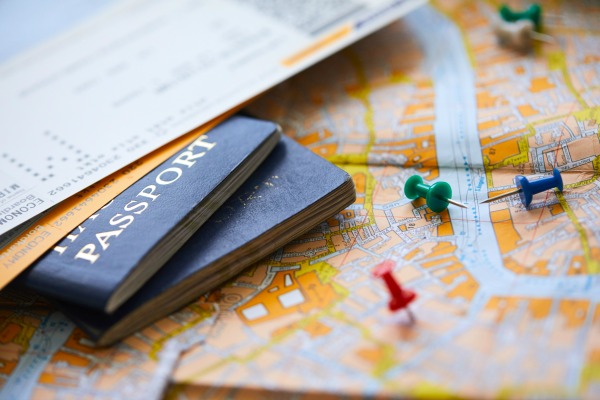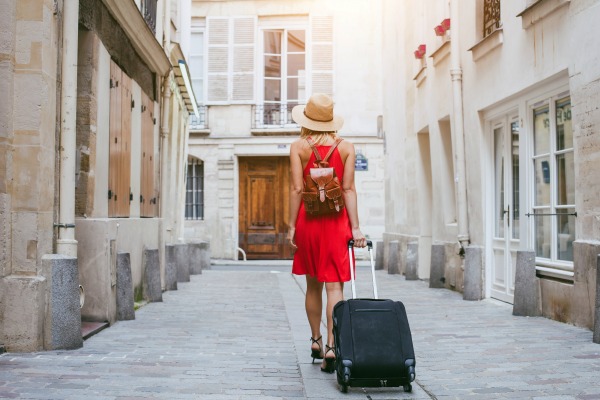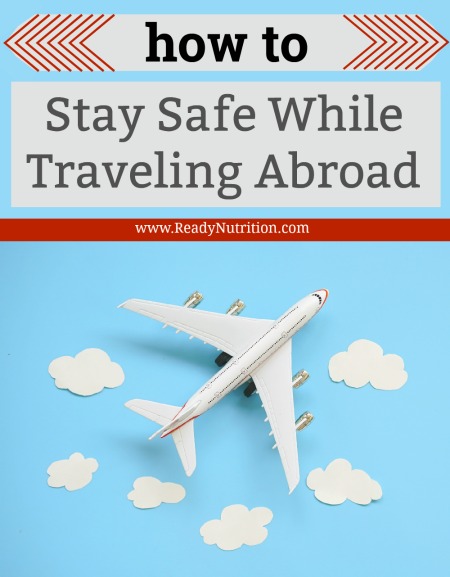Summer is nearly here. The kids will be out of school soon, and you and your family will finally get some much-needed vacation time.
If you are planning a trip, it can be easy to get caught up in details about all of the exciting places you are going to visit, transportation, lodging, buying tickets, packing, and securing your home. There’s so much to do! But, be sure not to neglect one VERY important aspect of travel: safety.
Here’s how to make sure your vacation is a safe endeavor.
Research your destination.
Safety should always be your first priority. First, find out as much as you can about the safety of your destination. This is especially true if you are traveling to another country. For the most part, traveling throughout the world is safe, but there are safety precautions that should be taken no matter where you plan to go.
That being said, some locales are much riskier than others. This is something to keep in mind even if you are traveling in the United States. In fact, the US doesn’t even make the top ten list of most safe countries in the world, believe it or not! According to World Population Review’s Safest Countries In The World 2019, the top ten safest countries are:
- Iceland
- New Zealand
- Austria
- Portugal
- Denmark
- Canada
- Czech Republic
- Singapore
- Japan
- Ireland
If you are planning to travel within the United States, here are lists of the safest states and safest and most dangerous cities in the country: Best States – Public Safety Rankings and The 10 Safest and Most Dangerous Metro Cities in America for 2019.
Learn as much as you can about your destination before you plan a trip. Follow updates to make sure safety conditions don’t change prior to your vacation.
A good place to start your research is the U.S. Department of State’s website. There, you will find a travel advisories page that provides information on safety and security in every country in the world.
You can check for travel alerts before you plan a trip. The site uses a 4-level system for advisories:
Level 1 – Exercise Normal Precautions: This is the lowest advisory level for safety and security risk. There is some risk in any international travel. Conditions in other countries may differ from those in the United States and may change at any time.
Level 2 – Exercise Increased Caution: Be aware of heightened risks to safety and security. The Department of State provides additional advice for travelers in these areas in the Travel Advisory. Conditions in any country may change at any time.
Level 3 – Reconsider Travel: Avoid travel due to serious risks to safety and security. The Department of State provides additional advice for travelers in these areas in the Travel Advisory. Conditions in any country may change at any time.
Level 4 – Do Not Travel: This is the highest advisory level due to greater likelihood of life-threatening risks. During an emergency, the U.S. government may have very limited ability to provide assistance. The Department of State advises that U.S. citizens not travel to the country or to leave as soon as it is safe to do so. The Department of State provides additional advice for travelers in these areas in the Travel Advisory. Conditions in any country may change at any time. (source)
Travel Advisories are provided in list view with a search function and a color-coded world map.
Don’t be ignorant about where you are going. Make an effort to learn about the country, the political situation, the cultural norms, the safest spots for travelers, safe accommodations to stay and the areas or regions that are best avoided. The more you know, the better.
Get your travel documents organized.

If you are traveling abroad, there are certain documents you will need to carry with you. Checklists can be found here: Traveler’s Checklist.
Create an electronic backup of your immunization record, itinerary, medical insurance card, passport, plane tickets, travel insurance, and visas before you leave. Email the file to yourself and keep it in your inbox so you can access the information from your smartphone should the paperwork be lost or damaged. Print copies as well. Take one set of copies with you and give sets to family and/or friends just in case.
Collect emergency info and keep it in several places: in your luggage, in your hotel, on your person. Give a copy to each person in your family. Include contact info for local emergency services and your country’s embassy or consulate (if there is one).
You also can store all of this data in an app called TripIt.
While it might be tempting to keep all of your valuable items in your wallet or purse, it is not advisable. Keep anything you won’t be using in your hotel room, locked in a safe. Separate the monetary and identifying items you need to carry on you and put them in different places on your person. That way, if someone steals your wallet or purse, you won’t lose EVERYTHING.
There are backpacks, travel safes, carry bags and purses that have anti-theft features that you can purchase for use when you travel. Some products have features including slash-proof technology, security clips, and locks to deter thieves. Do not carry your wallet or other valuable items in your pockets (especially not in your BACK pocket).
Watch for pickpockets and thieves.
Speaking of important items you will be carrying around with you, please understand that pickpockets can be found pretty much everywhere, and they tend to prey on tourists. According to The Savvy Backpacker, there are some cities in Europe that are “pickpocket hotspots”:
- Barcelona, Spain
- Rome, Italy
- Paris, France
- Madrid, Spain
- Athens, Greece
- Prague, Czech Republic
- Lisbon, Portugal
- Florence, Italy
- London, England
- Amsterdam, Netherlands
Looks can be deceiving – many pickpockets do not look like common criminals. Many are young – between the ages of 10 to 16 – and are often well-dressed. Usually, they work in groups – one or two of them will create a distraction while another will steal items from unsuspecting individuals. Then, the thief might pass the stolen item(s) to another member of the group, and they will all scatter in different directions – making it difficult to figure out who actually has the stolen goods. Pickpockets often lurk at popular tourist attractions and in public transportation facilities.
A popular scam in Europe works like this. A group of thieves will pose as “charity workers” with clipboards:
They’ll approach you and point to a clipboard while signaling that they’re deaf and mute. They want you to sign a petition for charity. If you sign, they’ll ask for a donation to the charity. Of course the “charity” is fake — in fact, the money often goes to these girls’ “boss” (i.e., human traffickers). While the tourist is signing/reading the petition, there is often an accomplice trying to pickpocket the victim. (source)
Pickpockets and thieves use other tactics to steal from people. Most involve creating some kind of chaos in order to distract the victim so they can grab items from them. Thieves may bump into you, shove a map in your face, attempt to distract you while you are at an ATM, or drop or spill things in front of you.
Some scammers will pretend to offer you help with your bags. Some will even follow you down the street and try to chat you up so you will get comfortable and let your guard down. Don’t fall for it. Smile and keep walking. DO be friendly with hotel employees, taxi drivers, shopkeepers, and waiters, but be careful not to share too much personal information or details about your plans.
Be very careful about alcohol consumption while traveling abroad. Being drunk in public makes you more vulnerable to crime. Also, do not accept drinks from anyone you do not know. Avoid being out too late – getting back to your hotel at a fairly early hour can help you avoid the trouble that is sometimes associated with being out late.
Carry a whistle or personal safety alarm and a small flashlight. Consider using a doorstop alarm at your hotel.
Don’t look like a tourist.

Try to avoid walking around with a lot of bags or luggage. This makes you a prime target for thieves, as you will have difficulty paying attention to your surroundings while protecting all of the possessions you are lugging around.
Smartphones and tablets are also commonly stolen, so walking around with yours in your hand is not a good idea – thieves often run up to people and snatch them, or will swipe them off tables at restaurants and cafes. Keep your purse or bag in your lap – do not hang it on the back of your chair while dining out.
Expert traveler Norm Schriever offers a few additional tips:
Don’t walk around with an expensive camera or fancy jewelry hanging around your neck. Wear a cheap plastic watch, if any. Take it all off before you step out of a bar or restaurant at night. Carry a decoy wallet so if you get held up you can gladly throw them that one. Keep your wallet in your front pocket, and when you’re on a crowded street shift your backpack to the front.
Showing wealth will only make you more appealing to scammers and pickpockets. Try to blend in with the locals and your surroundings. Doing research on your destination is crucial for this reason. You’ll make yourself more vulnerable to con artists if you stick out like a sore thumb with your massive backpack, two cameras, and confused look on your face. You will attract a lot less attention if you make an effort to blend in.
Learn how to communicate in the country you are visiting, at least on a basic level. You should be able to ask for help in the local language.
While maps and foreign language phrase books are important items to carry with you, do not pull them out and start reading them while on a busy street. There are two reasons to avoid doing this: you’ll look like a lost tourist, and you’ll be distracted (both make you an easy target). Unless you are desperately lost and have no other option, do not ask strangers for directions. If possible, head into a restaurant or store to ask an employee if you need guidance. Plan your itinerary, routes, and directions in advance, from the safety (and privacy) of your hotel.
Be very careful about transportation – Don’t get into an unmarked cab. In some countries, it’s normal to use unmarked taxi services, just be aware of the situation and if you feel unsafe for any reason, wave them on and don’t get in.
If you rent a vehicle, keep the doors locked and windows up and don’t stop for anyone, ever. Never roll down your window or get out of the car if someone approaches you. For more on driving in other countries, see Driving and Road Safety Abroad.
Practice situational awareness.
This is perhaps the most important thing you can do while traveling, and it applies no matter your destination.
Always pay attention to your surrounds. Stay alert. If you are looking down at a map or have your nose buried in a guidebook or your smartphone, you will be an easy target for criminals. Keep your head up, watch what is going on around you, and acknowledge people. Project a strong and aware demeanor. Most criminals look for people who look fearful or weak.
When you enter a building or arrive at an attraction, take inventory of the area. Notice the people around you. If you see a suspicious person or item, you may take action to remove yourself from the situation and notify others of the potential threat. This is an optimal time to spot exits you can take in the case of an emergency.
If you think you are being followed, the best way to check is to pretend you were walking in the wrong direction. Turn around and go back where you came from. If the person continues to follow you, they may be a threat. Use this information to defend yourself or alert any nearby authorities.
Do not wear headphones while out in public, as they decrease your ability to hear what is going on around you.
Trust your instincts. If a person or situation seems off – if something just doesn’t seem right – do not ignore that feeling. It is better to be safe than sorry. To learn more about how to trust your gut and assess situations for danger, read The Gift of Fear and Other Survival Signals that Protect Us From Violence and Protecting the Gift: Keeping Children and Teenagers Safe (and Parents Sane), both by Gavin de Becker (Amazon links).
What do you think?
Are there special precautions you take when traveling? What do you do to prepare for trips? How do you keep your family safe on vacation? Please share your thoughts and ideas in the comments.

